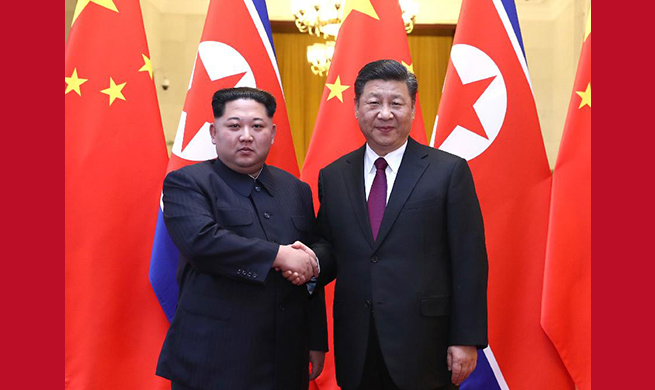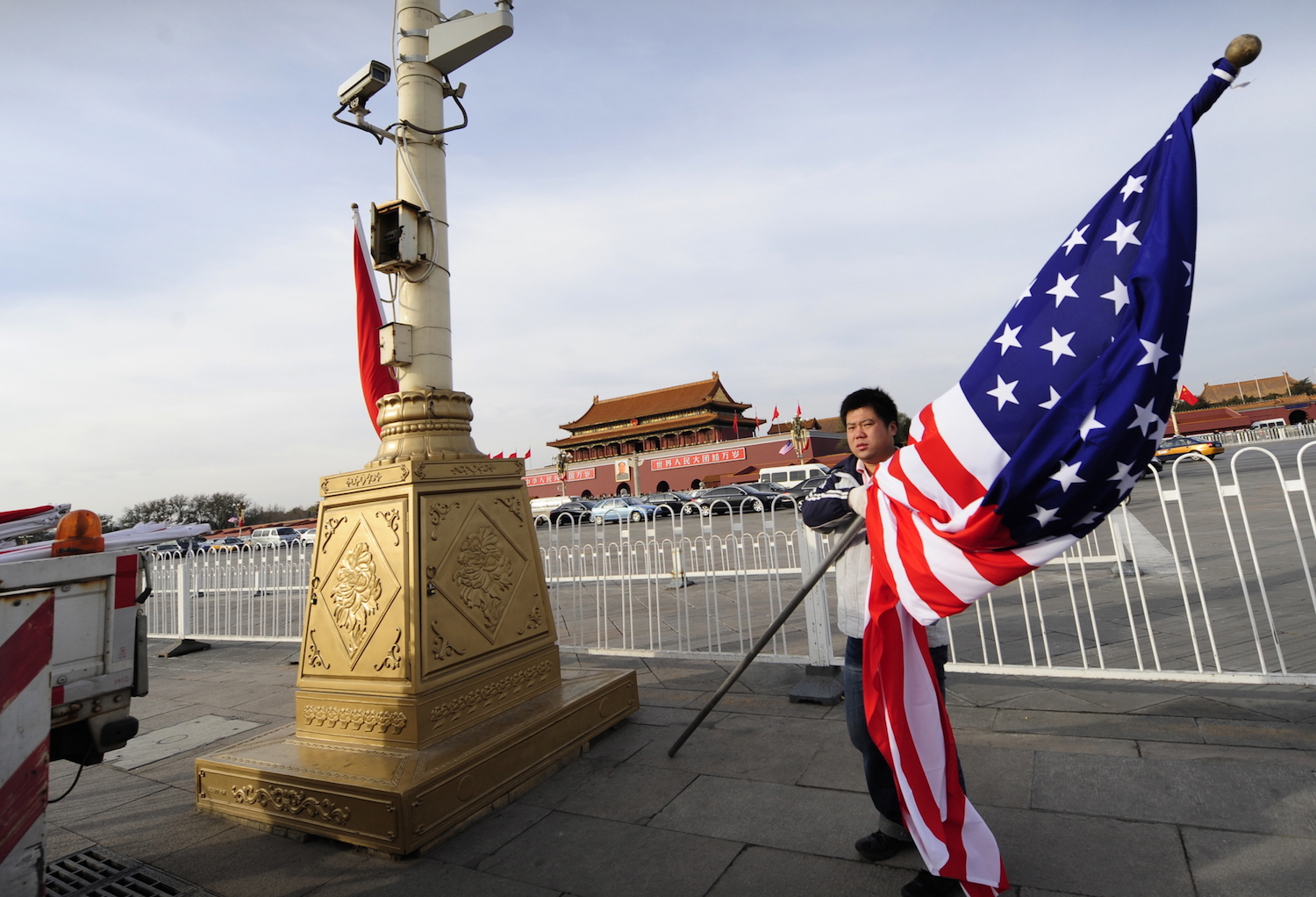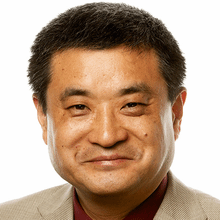
Kim Jong-un Visits Beijing
After two days of rumors, on Wednesday March 28, the official news agencies of China and North Korea announced that North Korea's leader Kim Jong-un had just completed a visit to Beijing. The "unofficial visit," as Xinhua put it, was Kim's first international trip since assuming power and an apparent surprise to much of the world. Amid much pageantry and with their wives taking part in the visit, Kim and Chinese Communist Party Secretary Xi Jinping both expressed commitment to the denuclearization of the Korean peninsula. How should Beijing handle its relationship with North Korea? What does the visit augur for the future of North Korea's nuclear program? And what does Kim's meeting with Xi mean for Kim's potential upcoming meetings with South Korean President Moon Jae-in and U.S. President Donald Trump? —The Editors

Kim Jong-un & Xi Jin
Comments of Zha Daojiong:
Quite conceivably, it was the appointment of the hawk John Bolton as Trump's National Security Advisor that prompted Kim Jong-un to get on his late father's rocket-proof train and make the journey to Beijing.
In the context of Trump's take-no-prisoners approach to trade disputes and other matters, including his handling of the relationships with close U.S. neighbors Mexico and Canada, the North Koreans understandably got a bit nervous.
The timing of Kim's trip to China leaves room for speculation on all fronts. Official accounts from both Chinese and North Korean sources speak in glowingly positive terms about the visit. Friendship cultivated by the ancestors of current leaders of both countries gets renewed. But if you compare official versions of such visits by Kim's ancestors, especially his father's visit, there is not that much that is truly groundbreaking.
With regard to the nuclear issue, it does seem that Kim Jong-un is making clear that he is prepared to see "denuclearizationof the peninsula" (emphasis added by me). In the past, news reports, particularly those by Western media outlets, generally leave out reference to the peninsula. It is a mistake that is being repeated again.
Now, reference to the peninsula is where the complication begins. There are two actors in the southern part of the Korean peninsula: South Korea and the United States. Is North Korea expecting the U.S. to agree on and then follow through with a statement about what its military does in the future? For example, what if the United States stations nuclear submarines at the ports in the south?
For China, both North Korea and South Korea are neighbors that cannot move away. During the past year, China went along with the United States—though not exactly 100 percent—in applying economic sanctions on North Korea. It hurts what is normally called "traditional friendship" with the North. But, as Trump's choice of action showed, China failed to earn much of any appreciation from the Trump White House: Beijing learned about Trump's agreement to meet Kim from television news.
Kim's trip to Beijing may generate a couple of days of media interest. But in the end, it is not going to make much of a dent in the dynamics. The drivers of the train of geopolitics on the Korean peninsula continue to be Pyongyang, Seoul, and Washington.
When Trump and Kim Meet, What Will Xi Do?
On March 8, South Korea's National Security Advisor announced that Donald Trump had agreed to meet with North Korean leader Kim Jong-un by May. Although now-ousted Secretary of State Rex Tillerson previously down played the announcement, a summit between the two men could drastically change U.S. policy in Asia. How does this affect China's interests in the region? And how would Beijing feel about a Trump-Kim summit?
Graffiti depicting Donald Trump and Kim Jong-un, by artist Lush Lux, in Vienna, Austria, August 20, 2017
Comments of Zha Daojiong:
A kim-Trump meeting opens a window of opportunity for the international community to shift its hopes away from China taking "responsibility" for North Korea's nuclear behavior and toward asking Washington to do its fair share.
Under Trump, United States officials adopt an extreme position relative to American security research elites who for decades have argued that recent Chinese success was made in the United States. They argue that Washington aided China by letting it into the World Trade Organization and by using the U.S. Navy to keep the Indian and Pacific oceans open for shipping in and out of Chinese ports.
In exchange, Washington exhibits a sense of moral high ground by expecting China to implement North Korea-related policies Washington decides alone or in consultation with Tokyo and/or Seoul.
China was surprised when Trump made North Korea a key topic in his first meeting with President Xi in April 2017. Beijing has long argued that North Korea is a sovereign nation that pursues its own foreign and defense policies.
When Trump called Xi a week later, again over North Korea, it was yet another affirmation of the end of Obama-era strategic patience with Pyongyang. But isn't Trump's impatience equally directed at Beijing? Is America's Korea policy establishment ignorant about the limits of Chinese influence over North Korean behavior?
Viewed from China, North Korea is NOT an area in which the Obama administration failed to act. After all, under Obama, the U.S. deployed to South Korea its military's most powerful high altitude antimissile defense system (THAAD).
THAAD was the single issue that managed to reverse the goodwill generated between Beijing and Seoul at the start of the Park Geun-hye administration in February 2013. Park was the only head of state from an OECD country to attend the September 2015 military parade in Beijing commemorating the 70th anniversary of the end of World War II. The United States successfully lobbied virtually all of its key allies to boycott the parade.
The Kim-Trump meet-up is difficult to forecast. A bit of history is useful. It's often forgotten that when the U.S. reached an arrangement with Pyongyang in 1994 for North Korea to abandon its nuclear weapons program, China was not invited to participate, either in the diplomatic process or in the ensuing aid-for-freeze arrangement under the Korean Energy Development Organization (KEDO) program. The KEDO process stumbled for 10 years, both on the ground and in diplomatic terms. It was only after Pyongyang's withdrawal from the Treaty on the Non-Proliferation of Nuclear Weapons in January 2003, marking the complete failure of all preceding efforts, that China was asked to be part of the multilateral effort to entice Pyongyang to change its behavior.
A preferred outcome of the Kim-Trump meet-up would be a lessening of tensions that enabled average Westerners to travel to North Korea to see the society for themselves. First-hand knowledge could help counter-balance the portrayal—with a heavy dose of Western imagination and propaganda—of China's influence over North Korea.
Is American Policy toward China Due for a 'Reckoning'?
In a February 13 Foreign Affairs essay, former diplomats Kurt M. Campbell and Ely Ratner argue that United States policy toward China, in administrations of both parties, has relied in the past on a mistaken confidence in America's ability to "mold China to the United States' liking." They call for a new U.S. approach to China, one which faces the degree to which China's actions have diverged from U.S. expectations, discards the notion that economic liberalization would lead China to political openness, and acknowledges China's failure to acquiesce to an American-led security order. Is Campell and Ratner's characterization of the shortcomings in the U.S. approach persuasive? What should a newly clear-eyed U.S. policy entail? —The Editors
Comments of Zha Daojiong:

A worker holds a U.S. flag on Tiananmen Square in Beijing ahead of a visit by U.S. President Barack Obama on Nov.16, 2009.
Prosperity without freedom is just another form of poverty." That statement in former President Barak Obama's remarks to the Australian parliament in November 2011, to lay out his case for a 'pivot', rang loud enough for some concerned Southeast Asian observers—privately, of course—to express a sense of exasperation when conferring with us Chinese scholars.
After all, if there is one achievement in which contemporary China can take legitimate pride, poverty reduction is it. Imports from other countries—including raw materials from poor and developing economies—function as a means of poverty reduction more broadly. Yes, there is a whole host of issues, environmental and human rights along the way, but isn't that a component of the global chain of production in the first place? What was the United States demanding China's trading partners to choose between?
The level of continuity—both in philosophizing and policy designs— between the Trump Administration's China strategy and that of the Obama Administration is extremely high. Some observers erroneously point to the withdrawal from the Tran-Pacific Partnership (TPP) as an indicator of major difference. The TPP, not submitted to Congress for ratification, was facing serious domestic obstacles anyway. Along the way, the degree of a China factor therein is very much a subject for academic guess work.
On the China side, President Xi is quoted having observed during his first meeting with President Trump that, "We have a thousand reasons to get China-U.S. relations right and not one reason to spoil the relationship.”
It is not that Americans and Chinese across the board disagree with the wording itself. Real differences exist over who the "we" are, who is doing the "spoiling," and what is "right." Well, this is not the first time such differences exist and it sure won't be the last time either.
No matter how the debate went on the U.S. side, since the re-normalization of diplomatic ties with Washington, China has benefited from having a stable relationship. There can be no question about that.
Now, has China short changed the United States in the process? With the U.S. so firmly committed to keeping Taiwan a separate entity from the mainland, it would be politically suicidal for any Chinese leadership to publicly express gratitude to the United States. When leadership in Beijing emerges through multi-party, competitive and free elections, will the Taiwan issue logically go the American way? Well, some political science textbooks say so. But neither Beijing nor Washington is taking any chance.
Other than the Taiwan issue, it is truly hard for anyone in China to truly justify pursuing a policy towards the U.S.—bilaterally, regionally, or globally—that is confrontational by nature.
China has benefited from being open to influence—designed or not —from the United States. This is an unspoken yet powerful fact, accepted by millions of Chinese, those in the leadership included. There are facets in that influence that China does not accept or will take time to accept. But the notion of China working to upstage the United States is just too fanciful to be taken seriously.
There certainly is an element of competition, which in turn is a useful means against complacency. As a matter of fact, I see the ongoing discussion among American security elites about U.S. policy towards China as a living example of a society that has a long history against complacency. There are useful things for China to learn from such a trait in American civilization.
Zha Daojiong:

Zha Daojiong, formerly a Senior Arthur Ross Fellow at the Center on U.S. China Relations at the Asia Society, is a Professor of Peking University Institute of Ocean Research and School of International Studies, where he specializes in studying such non-traditional security topics as energy, food, and trans-boundary water use. His recent research interest has expanded to political/societal risk management for Chinese foreign direct investment in developing as well as developed economies. His Area Studies expertise covers Southeast Asia, the trans-Pacific region, and Africa. Zha is the author and editor of several books, including Managing Regional Energy Vulnerabilities in East Asia (Routledge, 2013), Building a Neighborly Community: Post-Cold War China, Japan, and Southeast Asia (Manchester University Press, 2006), The International Political Economy of China's Oil Supply Security (in Chinese, 2005), andChina's International Relations in the 21st Century: Dynamics of Paradigm Shifts (University Press of America, 2000). He has published dozens of academic articles in refereed journals in English and Chinese. Prior to his tenure at Peking University (since 2007), he taught at the University of Macao, the International University of Japan, and Renmin University of China. Zha studied at the University of Hawaii, where he received his Ph.D. in Political Science.
Source: http://www.chinafile.com/conversation/kim-jong-un-visits-beijing
Source: http://www.chinafile.com/conversation/when-trump-and-kim-meet-what-will-xi-do
Sourse: http://www.chinafile.com/conversation/american-policy-toward-china-due-reckoning